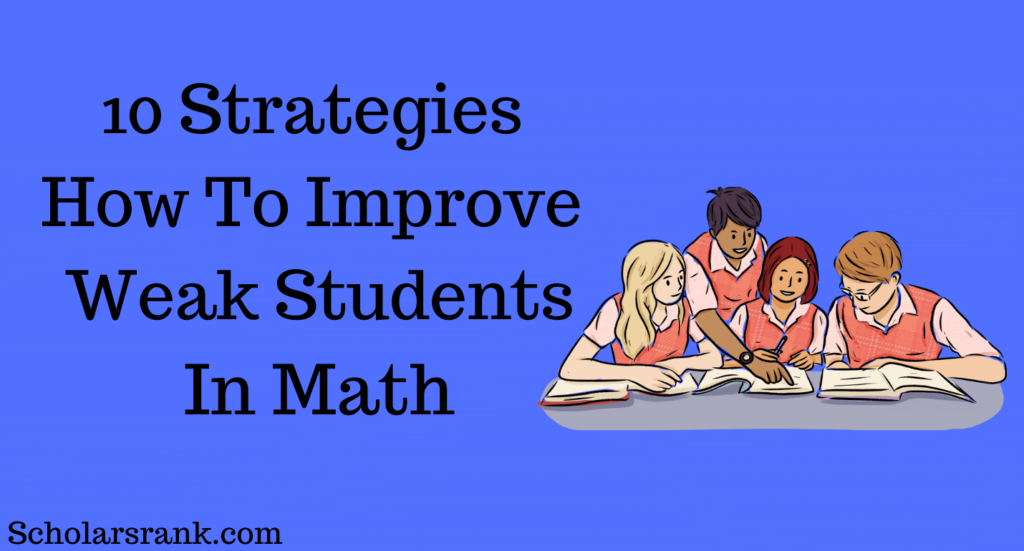Introduction
What does it take on how to improve weak students in math? Any formal education school system around the globe must have mathematics as a core subject. It is employed in every aspect of life as well.
However, a lot of students have trouble understanding the subject’s foundations. How can we help improve weak students in math given how important it is? Some techniques help weak students improve in math, however, there are no absolute laws.
The good news is that weak students can improve in math class despite having a natural aptitude or being “excellent at math” with the correct work, attitude, and behavior. It’s a fantastic idea to use mathematical modeling to address actual, open-ended problems using quantitative skills.
Reasons Why Students Struggle With Math
- Lack of ability to understand fundamental math concepts: A student’s inability to picture and comprehend fundamental math concepts.
- Rote learning techniques: instructing a child to memorize formulas and sentences.
- describing students as “poor learners” or “deficient in math”.
- Pressure to perform well academically: The anxiety and pressure of achieving high grades. Good grades ought to follow conceptual knowledge.
- Report card comments for “weak pupils” are made when teachers merely comment on the poor performance rather than offering suggestions for improving weak students.
- A persistent belief that mathematics is difficult
- Weak foundations
- Unclear conceptualization
- Lack of confidence
What To Do Before Implementing Tips On How To Improve Weak Students In Math
- A successful first step in opening up students to make them more receptive to the evidence-based teaching methods that work is getting to know each student individually. Students are more likely to take risks in the classroom when they feel heard and understood.
- Discuss the students’ stories with them. How did they reach their current location? How do they feel about their math deficiencies? Do they realize just how much they have fallen behind? Given that taking risks in the past might not have been successful for them, are they willing to do it again?
- Teachers must convey consistently that a school is a secure place where pupils do not need to keep their defensive walls up, to develop conceptual knowledge, math competencies, and problem-solving skills.
10 Strategies To Improve Weak students In Math
- Cultivate A Learning Mindset
Without confidence and optimism, you cannot start scaling up or improving your math abilities. Many students struggle to be successful in math lessons because they are unsure of themselves in this area. You won’t genuinely get better at this subject if you constantly think you can’t.
Remind yourself that you can accomplish it and that you will do it as you gain confidence in your talents. That’s it! Nobody will be able to stop you from succeeding if you have an optimistic attitude. If you continue to view math negatively, working will get increasingly difficult. You will subsequently leave it in the same manner that, which is not what we desire.
- Free The Child’s Mentality From The Stress Of Grades.
The student is already having difficulty in math.
The stress of performing well on exams at school will only make the student’s situation worse and distance him or her even further from a fundamental comprehension of math ideas.
Know the proper report card remarks for weak students, and how to enhance the academic performance of weak students.
Keep in mind that educating a child is more like a long-term marathon than a quick sprint.
If the student falters in a sprint, it is okay; keep your attention on the marathon. Simply explaining to your child that you value actual understanding of math over grades and that he or she should strive for that aim rather than grades will open up a world of creativity for them.
- Encourage Students To Enjoy The Subject
It’s critical to realize that mathematics will benefit your kids in the long run; this is why it’s more crucial than ever for them to comprehend the subject and use it in everyday situations than it is for them to achieve high grades in primary school. Therefore, encourage your children to appreciate math by demonstrating how it is used in real-world situations in their daily lives. This will help them understand the value of the topic.
Start with engaging images and games that incorporate mathematics, and then step it up. Encourage them to pose crucial inquiries like, “What does a certain term mean?” Why are we taught this? Where can we practically use it? Every inquiry, no matter how basic, is crucial to having a clear understanding of the subject.
- Focus on the Fundamentals
A subject of connections, mathematics. It has a pyramidal shape, meaning that each notion is connected to the others. After passing the yearly exams and moving into a new class, students who have completed one academic year of mathematics cannot simply forget what they have learned.
It is difficult to do better if prior topics are incorrectly understood because what they learn each year serves as the foundation for the syllabus the following year.
Teach your student the fundamentals of the subjects, assist them in practicing diligently every day until they have a firm understanding of the principles, and only then introduce the following chapter or concept.
- Prioritize Weak Sections
Focus on the ideas or chapters your students need further practice with after mastering the fundamentals of mathematics. In reality, categorizing the subject’s concepts into separate groups is a useful first step.
- Simple topics
- Moderate subjects that don’t require much practice
- Issues are difficult and demand a lot of practice.
You will be able to split the time your students spend learning math in a meaningful way in this manner. To advance, please make sure you focus more on the areas they find difficult, work on them, try alternative approaches to see how your student knows them, and go in that direction.
- Make Sure Your Student Practice
Practice is the key to getting good grades in math. It’s crucial to make students practice often, for hours if necessary, when learning complex subjects. Ask them several questions that encourage critical thought, then see how they address the issues.
Understanding and knowledge of numerous problem kinds, formulas, equations, and questions are prerequisites for success in mathematics. Only with the appropriate amount of experience is all of this feasible. Your student will instantly start to enjoy the subject, feel more at ease, and be prepared to learn advanced topics if they practice every day.
- Ensure They Take Notes
There are numerous equations and formulae used in mathematics. Encourage those with sensitive brains to get into the habit of taking notes on all the important details because learning will initially be somewhat difficult for them. Taking notes is beneficial and it will:
- Help recall the equations and formulas.
- Serve as a quick reference When needed
- Serve as study aids for the test.
- Examine The Errors
Try to keep a few brief practice exams at home to monitor the effectiveness of the practice and the level of conceptual understanding in the students. Make sure your inquiries are unique and gauge their capacity for critical thought.
When the exam is over, analyze the findings, identify their mistakes, and help them realize how the question could have been answered more effectively or simply. Encourage students to ask questions whenever they don’t comprehend anything or run into a problem.
- Use Math in Everyday Life
Making mathematics a regular part of your life will do more than anything to help students understand it. The topic will become more meaningful and manageable as a result.
Ask your students, for instance, to look at the shopping list, calculate, pay the bill, and retain the change. This is meant to aid students in basic mathematical processes.
Tell them that math is present everywhere, for example, in the geometry of colors and the fractions of bread. Explain the ideas by linking them to many scenarios from your daily activity, even as you are practicing. Students will never forget the subject principles this way.
- Employ a Private Tutor
In the modern world, both parents are typically quite busy managing their careers, the family home, costs, and the children’s and own well-being.
They barely have any time left to dedicate to regular study sessions after taking everything in stride, after all, a day only has 24 hours! This is where a personal mentor can help; hire a tutor or personal mentor for your children to assist them with the perplexing nature of mathematics.
Conclusion
One of the qualities of a great math instructor is the capacity to possess a variety of knowledge regarding how to improve weak students in math and meet them where they are, regardless of level. All ten (10) of these strategies are essential for meeting the needs of all math students, but they are particularly crucial for those students who have the most space for improvement.
This is why we went into great length on the strategies that can be used by parents or teachers to help weak students in math.
Frequently Asked Questions (FAQs)
How Do You Inspire Math Students?
Make use of math for fun: Puzzles, games, paradoxes, the school building, or other adjacent structures can all serve as recreational motivation. These gadgets must be succinct and easy to understand in addition to being chosen for their particular motivational benefit.
Why Do Students Have Trouble With Math?
A student may struggle with math at school for a variety of reasons, from low motivation brought on by math anxiety to a lack of comprehension of how to apply and carry out mathematical operations.
You can also read Best ways on how to improve math skills for adults.








